Israel’s recognition of Somaliland ‘strange, unexpected’: Somali president
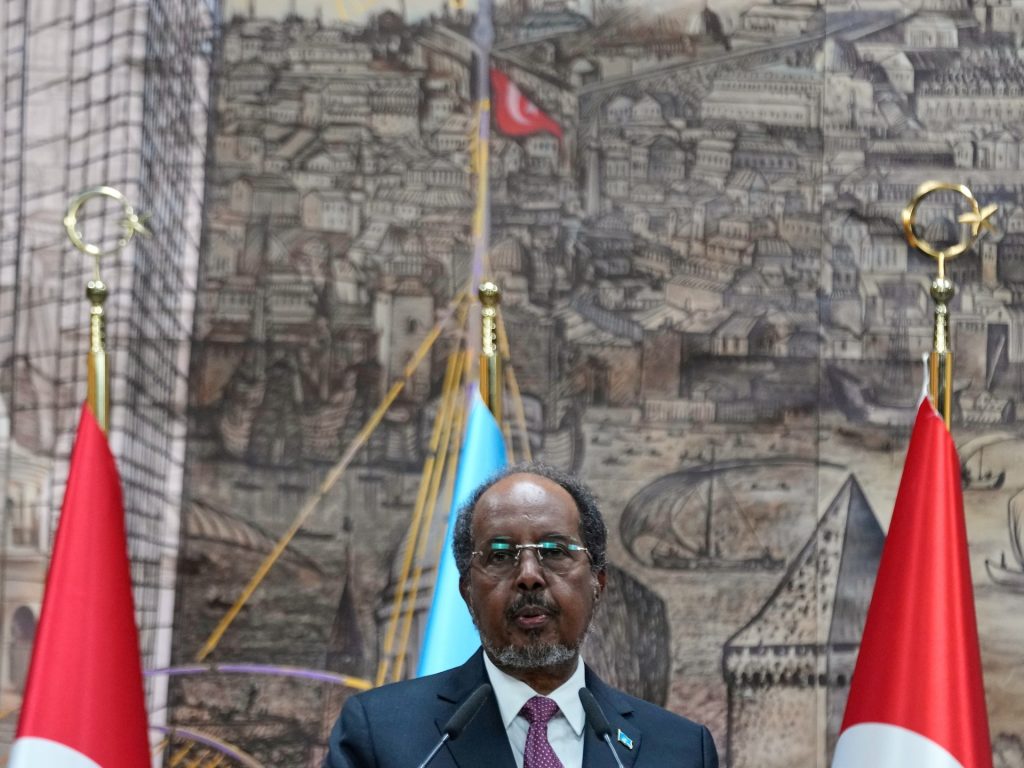
EXCLUSIVE Hassan Sheikh Mohamud says his country believes the move is linked to Israel’s plans to forcibly displace Palestinians from Gaza. Somali President Hassan Sheikh Mohamud has told Al Jazeera that Israel’s “unexpected and strange” recognition of Somaliland may have implications for Palestinians in Gaza. “Somaliland has been claiming the secession issue for a long time, over the past three decades, and no one country in the world has recognised it,” Mohamud told Al Jazeera in an exclusive interview from Istanbul, Turkiye, on Tuesday. Recommended Stories list of 4 itemsend of list “For us, we’ve been trying to reunite the country in a peaceful manner,” the Somali leader added. “So, after 34 years, it was very unexpected and strange that Israel, out of nowhere, just jumped in and said, ‘We recognise Somaliland’.” Israel last week became the first and only country to formally recognise Somaliland, a breakaway region in northwest Somalia, bordering the Gulf of Aden. Somalia’s president also told Al Jazeera that, according to Somali intelligence, Somaliland has accepted three Israeli conditions in exchange for Israeli recognition: the resettlement of Palestinians, the establishment of an Israeli military base on the coast of the Gulf of Aden, and Somaliland joining the Abraham Accords. The accords are a set of pacts establishing the normalisation of ties between Israel and several Arab states. The UAE, Bahrain, Morocco and Sudan have signed onto the accords. Mohamud also said that Somalia has intelligence indicating there is already a certain level of Israeli presence in Somaliland, and Israeli recognition of the region is merely a normalisation of what was already happening covertly. Advertisement Israel will resort to forcibly displacing Palestinians to Somalia, and its presence in the region is not for peace, the Somali leader added. A 20-point plan released by the administration of US President Donald Trump ahead of a ceasefire between Israel and Hamas in Gaza said that “no one will be forced to leave Gaza, and those who wish to leave will be free to do so and free to return”. However, Israel has reportedly continued to explore ways to displace Palestinians from the besieged and occupied territory, including in mysterious flights to South Africa, which has formally accused Israel of committing genocide in Gaza. Israel is also seeking to control strategically important waterways connecting vital seas of commercial and economic significance, namely the Red Sea, the Gulf and the Gulf of Aden, Mohamud said. The Somali leader was in Turkiye on Tuesday, where he gave a joint news conference with Turkish President Recep Tayyip Erdogan, with the two leaders warning that Israel’s recognition of the breakaway region could destabilise the Horn of Africa. Somaliland declared independence from Somalia in 1991, but had failed to gain recognition from any United Nations member state, before Israel changed its position last Friday. Israel’s move was swiftly condemned, including by most members of the UN Security Council at an emergency meeting convened in New York on Monday. The United States was the only member of the 15-seat body that defended Israel’s move, although it stressed that the US’s position on Somaliland remained unchanged. Adblock test (Why?)
Russia-Ukraine war: List of key events, day 1,406

These are the key developments from day 1,406 of Russia’s war on Ukraine. Published On 31 Dec 202531 Dec 2025 Click here to share on social media share2 Share Here is where things stand on Wednesday, December 31: Fighting Russian forces shelled the town of Kostiantynivka in Ukraine’s Donetsk region, killing one person, an official said. The deadly attack came a day after an attack in Druzhkivka killed another person and wounded four, according to the Ukrinform news agency. Russian forces also launched waves of attacks on the Black Sea ports of Pivdennyi and Chornomorsk in Ukraine’s Odesa region, hitting two Panama-flagged civilian vessels – Emmakris III and Captain Karam – as they approached to load wheat, the Ukrainian navy said. Ukrainian Deputy Prime Minister Oleksii Kuleba said that oil storage tanks were also hit in the port attacks. Authorities in Ukraine’s northern Chernihiv region introduced a mandatory evacuation order for the residents of 14 border villages in four districts. The order will affect some 300 people who still live in the Novhorod-Siverskyi, Semenivka, Snovsk, and Horodnya communities, which have been experiencing daily shelling, an official said. Ukrainian Deputy Minister of Energy Olha Yukhymchuk said that 75,000 households in Chernihiv remain without electricity following Russian attacks on energy infrastructure in the region. There were also settlements in the Kharkiv and Sumy regions that were fully or partially without electricity, she said. Yukhymchuk also said that repair work had been completed on transmission lines near the Zaporizhzhia nuclear power plant to ensure “stable and reliable power supply to the station in the event of damage or shutdown of the Dniprovska overhead line due to” Russian shelling. Russia’s Ministry of Defence said it had taken control of two more settlements in eastern Ukraine. It identified them as the village of Lukianivske in the Zaporizhia region and the settlement of Bohuslavka in the Kharkiv region. Russian authorities said that a Ukrainian drone attack on the Russian Black Sea port of Tuapse damaged port infrastructure and a gas pipeline in a residential area there. The regional administration said no injuries were reported. Other Ukrainian drone attacks on Russia’s Belgorod region killed a woman and wounded four other people, local authorities said. Advertisement Alleged attack on Putin’s residence Kremlin spokesman Dmitry Peskov said that Russia will “toughen” its negotiating position in talks on a deal to end the war in Ukraine as a “diplomatic consequence” of an alleged attempted drone attack on Russian President Vladimir Putin’s residence in northwestern Russia’s Novgorod on Sunday. Peskov said the attack, which Ukraine denies, was aimed at collapsing the peace talks and accused Western media of playing along with Kyiv’s denial. Ukraine has dismissed the Russian claim as lies aimed at justifying additional attacks against Kyiv and prolonging the war. Ukrainian Minister of Foreign Affairs Andrii Sybiha said Russia had not provided any plausible evidence of its accusations. “And they won’t. Because there’s none. No such attack happened,” Sybiha said on X. Ukrainian President Volodymyr Zelenskyy slammed countries, including India and the United Arab Emirates, that have condemned the alleged attack, which he said “didn’t even happen”. He called the moves “confusing and unpleasant”. China said “dialogue and negotiation” remain the only “viable way out of the Ukraine crisis”, when asked for a comment on the alleged attack on Putin’s residence. Lin Jian, a spokesperson for China’s Ministry of Foreign Affairs, also called on “relevant parties to follow the principles of no expansion of the battlefield, no escalation of fighting and no provocation by any party”, to work towards the de-escalation of the situation, and to “accumulate conditions for the political settlement of the crisis”. The Institute for the Study of War, a Washington, DC-based think tank, said that its analysts found that the “circumstances” of the alleged attack did not fit the “pattern of observed evidence” usually seen “when Ukrainian forces conduct strikes into Russia”. The US ambassador to NATO, Matthew Whitaker, cast doubt on Russia’s accusation, saying he wants to see US intelligence on the incident. “It is unclear whether it actually happened,” Whitaker told Fox Business’s Varney & Co. The German government also said it shares Ukraine’s concern that Russian allegations of the attack could be used as a pretext for further escalation of Moscow’s war. Diplomacy Zelenskyy said that Ukraine and the Coalition of the Willing group of nations backing Kyiv plan to hold their next meetings at the start of January. Zelenskyy said that the countries’ national security advisers would meet in Ukraine on January 3, and with the leaders in France on January 6. He also told reporters that Kyiv was discussing with US President Donald Trump the possible presence of US troops in Ukraine as part of security guarantees. “Of course, we are discussing this with President Trump and with representatives of the [Western] coalition [supporting Kyiv]. We want this. We would like this. This would be a strong position of the security guarantees,” the Ukrainian president said. Polish Prime Minister Donald Tusk told officials that there is reason to hope for peace in Ukraine quite soon. “Peace is on the horizon; there is no doubt that things have happened that give grounds for hope that this war can end, and quite quickly, but it is still a hope, far from 100 percent certain,” he said. Tusk said security guarantees offered to Kyiv by the US were a reason to hope the conflict could end soon, but that Kyiv would need to compromise on territorial issues. The US removed sanctions on Alexandra Buriko, the former chief financial officer of Russia’s state-owned Sberbank, according to the US Treasury Department. Buriko was among a group of senior executives and board members who resigned from Western-sanctioned Sberbank shortly after Russia’s full-scale invasion of Ukraine in 2022. She sued the Treasury Department in a Washington federal court in December 2024, arguing she had severed ties with Sberbank days after it was sanctioned and that her continued inclusion on the sanctioned list was unlawful. Advertisement Weapons
UN Security Council members condemn Israel’s recognition of Somaliland
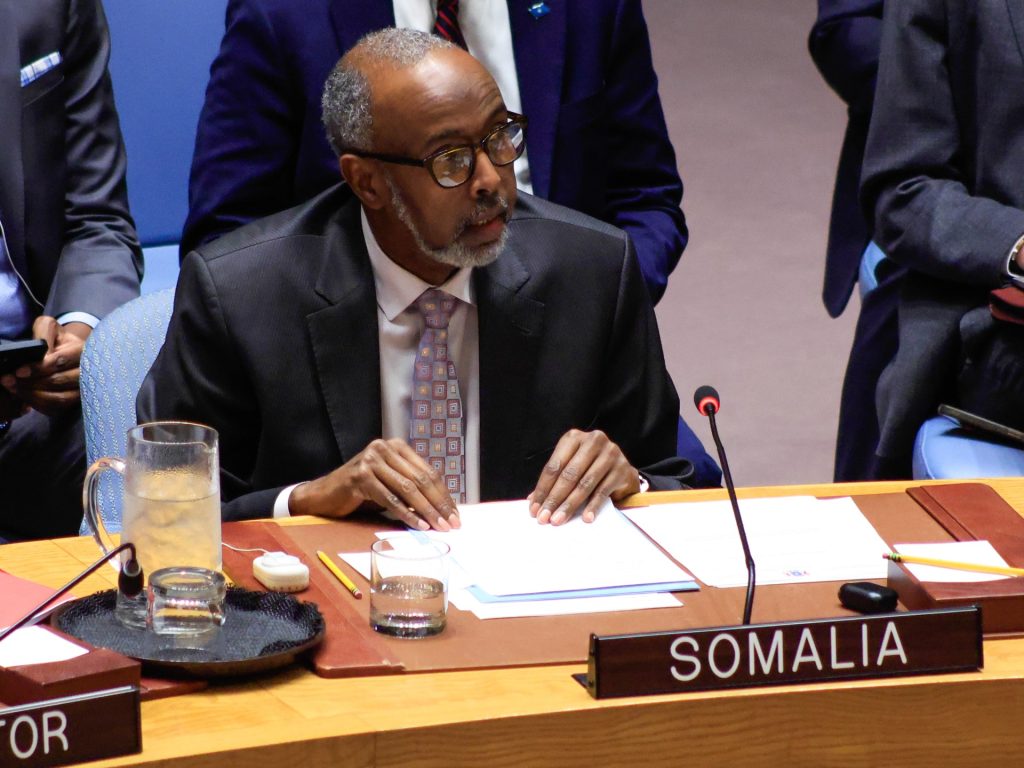
Most United Nations Security Council (UNSC) members have slammed Israel’s recognition of Somaliland at a meeting convened in response to the move, which several countries said may also have serious implications for Palestinians in Gaza. The United States was the only member of the 15-member body not to condemn Israel’s formal recognition of the breakaway region of Somalia at the emergency meeting in New York City on Monday, although it said its own position on Somaliland had not changed. Recommended Stories list of 4 itemsend of list Addressing the UNSC, Somalia’s UN ambassador, Abu Bakr Dahir Osman, implored members to firmly reject Israel’s “act of aggression”, which he said not only threatened to fragment Somalia but also to destabilise the wider Horn of Africa and the Red Sea regions. In particular, Osman said that Somalia was concerned the move could be aimed at advancing Israel’s plans to forcibly “relocate the Palestinian population from Gaza to the northwestern region of Somalia”. “This utter disdain for law and morality must be stopped now,” he said. The emergency meeting was called after Israel last week became the first and only country to recognise the self-declared Republic of Somaliland as an independent and sovereign state. Al Jazeera’s Gabriel Elizondo, reporting from UN headquarters in New York, said that “14 of the 15 council members condemned Israel’s recognition of Somaliland”, while the US “defended Israel’s action but stopped short of following Israel’s lead”. Tammy Bruce, the US deputy representative to the UN, told the council that “Israel has the same right to establish diplomatic relations as any other sovereign state”. Advertisement However, Bruce added, the US had “no announcement to make regarding US recognition of Somaliland, and there has been no change in American policy”. Israel’s deputy ambassador to the UN, Jonathan Miller, told the council that Israel’s decision was “not a hostile step toward Somalia, nor does it preclude future dialogue between the parties”. “Recognition is not an act of defiance. It is an opportunity,” Miller claimed. Many other countries expressed concerns about Israel’s recognition of Somaliland, including the implications for Palestinians, in statements presented to the UNSC. Speaking on behalf of the 22-member Arab League, its UN envoy, Maged Abdelfattah Abdelaziz, said the group rejected “any measures arising from this illegitimate recognition aimed at facilitating forced displacement of the Palestinian people, or exploiting northern Somali ports to establish military bases”. Pakistan’s deputy UN ambassador, Muhammad Usman Iqbal Jadoon, said at the meeting that Israel’s “unlawful recognition of [the] Somaliland region of Somalia is deeply troubling”, considering it was made “against the backdrop of Israel’s previous references to Somaliland of the Federal Republic of Somalia as a destination for the deportation of Palestinian people, especially from Gaza”. China and the United Kingdom were among the permanent UNSC members to reject the move, with China’s UN envoy, Sun Lei, saying his country “opposes any act to split” Somalia’s territory. “No country should aid and abet separatist forces in other countries to further their own geopolitical interests,” Sun Lei said. Some non-members of the UNSC also requested to speak, including South Africa, whose UN envoy, Mathu Joyini, said that her country “reaffirmed” Somalia’s “sovereignty and territorial integrity” in line with international law, the UN Charter and the constitutive act of the African Union. Comparison with Palestinian recognition In addition to defending Israel’s decision, US envoy Bruce compared the move to recognise Somaliland with Palestine, which has been recognised by more than 150 of the UN’s member states. “Several countries, including members of this council, have unilaterally recognised a non-existent Palestinian state, yet no emergency meeting has been convened,” Bruce said, criticising what she described as the UNSC’s “double standards”. However, Slovenia’s UN ambassador, Samuel Zbogar, rejected the comparison, saying, “Palestine is not part of any state. It is illegally occupied territory… Palestine is also an observer state in this organisation [the UN].” Advertisement “Somaliland, on the other hand, is a part of a UN member state, and recognising it goes against… the UN Charter,” Zbogar added. The self-declared Republic of Somaliland broke away from Somalia in 1991, after a civil war under military leader Siad Barre. Adblock test (Why?)
China kicks off second day of military drills around Taiwan
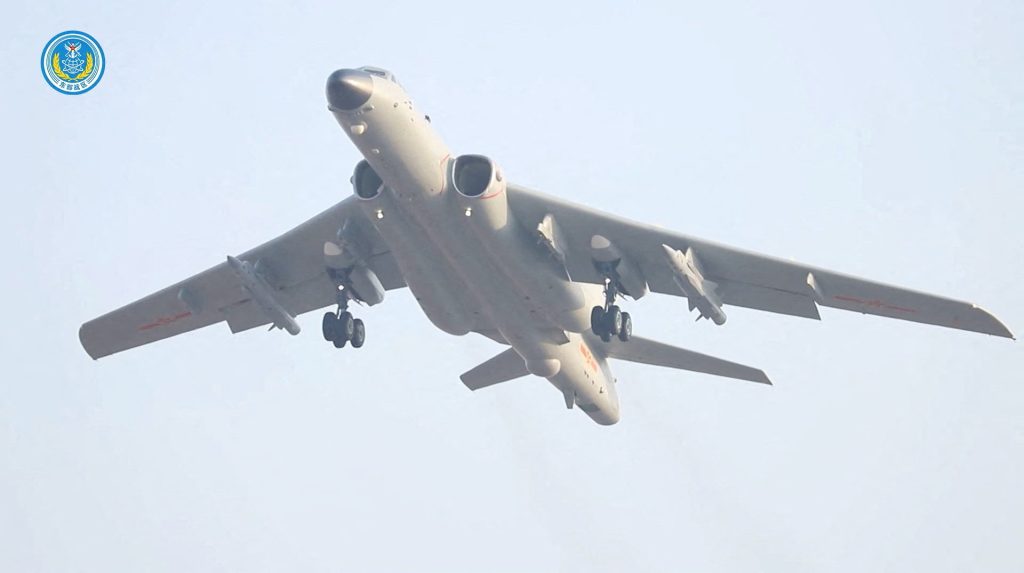
Day two of the ‘Justice Mission 2025’ drills will include 10 hours of live-fire exercises and a simulated blockade of Taiwan’s major ports. China has begun a second day of military drills around Taiwan in the latest escalation of tensions over the self-governing island. China’s military said on Tuesday that it had deployed navy destroyers, bombers and other forces as part of the war games, which Beijing claims are aimed at “separatist” and “external” forces. Recommended Stories list of 4 itemsend of list The drills were due to include live-fire exercises between 8am and 6pm local time (00:00 to 10:00 GMT) in five maritime and airspace zones around Taiwan, as well as air and sea patrols, simulated precision strikes and anti-submarine manoeuvres, according to Chinese state media. Taiwan’s Ministry of National Defence said some of the live-fire drills would take place in what Taiwan considers its territorial waters, or within 12 nautical miles (22km) from the coastline, according to Taiwan’s Central News Agency. More than 80 domestic flights were cancelled on Tuesday, many to Taiwan’s outlying islands, and more than 300 international flights could face delays due to rerouted air traffic during the drills, according to Taiwan’s Civil Aviation Administration. The exercises, code-named “Justice Mission 2025”, began early Monday and came days after the United States announced its largest-ever weapons package for Taiwan, worth $11.1bn. State news outlet The China Daily said the drills were “part of a series of Beijing’s responses to the US arms sales to Taiwan as well as a warning to the [Taiwanese president] Lai Ching-te authorities in Taiwan”, in an editorial on Monday. China’s Ministry of Foreign Affairs spokesperson, Lin Jian, also told reporters on Monday that the exercises were “a punitive and deterrent action against separatist forces who seek Taiwan independence through military buildup, and a necessary move to safeguard China’s national sovereignty and territorial integrity”. Advertisement Justice Mission 2025 marks the sixth time China has staged large-scale military drills around Taiwan since then-US Speaker of the House of Representatives Nancy Pelosi visited Taiwan in 2022. A key focus of the “Justice Mission 2025” exercises will be “anti-access and area denial capability” to ensure that Taiwan cannot receive supplies from allies like Japan and the US during a conflict, according to William Yang, senior analyst for Northeast Asia at the Crisis Group. They will also include simulating a blockade of Taiwan’s major ports in the north and south, and taking control of strategically important waterways, like the Bashi Channel and Miyako Strait, through which Taiwan imports much of its energy supplies, Yang said. China’s Eastern Theatre Command released a poster on Tuesday, titled “Hammer of Justice: Seal the Ports, Cut the Lines”, showing large metal hammers hitting the port of Keelung in the north and the port of Kaohsiung in the south. Taiwan’s Defence Ministry said it had tracked 130 air sorties by Chinese aircraft, 14 naval ships and eight “official ships” between 6am on Monday (22:00 GMT, Sunday) and 6am on Tuesday (22:00 GMT, Monday). The exercises were also monitored by Taiwanese coastguard ships and an undisclosed number of naval vessels, according to Taiwan’s Defence Ministry. Adblock test (Why?)
Russia-Ukraine war: List of key events, day 1,405

These are the key developments from day 1,405 of Russia’s war on Ukraine. Published On 30 Dec 202530 Dec 2025 Click here to share on social media share2 Share Here is where things stand on Tuesday, December 30: Alleged attack on Putin’s residence Kremlin foreign policy aide Yury Ushakov said that an attack took place on Russian President Vladimir Putin’s residence in northwestern Russia’s Novgorod on Sunday, “practically immediately after” talks in Florida between US President Donald Trump and Ukrainian President Volodymyr Zelenskyy. The strike “will not go unanswered”, Ushakov said in remarks reported by Russian media, following a call between Trump and Putin. Russian Foreign Minister Sergey Lavrov said that Russian air defence systems shot down 91 long-range strike drones used in the attack and that no one was injured. Zelenskyy denied the claim, accusing Russia of trying to derail peace talks. However, Trump expressed anger over the alleged attack, telling reporters: “I was very angry about it.” When asked if the United States had evidence of the attack, Trump said, “We’ll find out.” Russian Ministry of Foreign Affairs spokesperson Maria Zakharova said that “the response to Kyiv’s attacks will not be diplomatic” and that Russia would be revising its negotiating position in the attack’s wake. The United Arab Emirates’s Ministry of Foreign Affairs said in a statement that it “strongly condemned” the “deplorable attack” and “the threat it poses to security and stability”. Diplomacy White House spokeswoman Karoline Leavitt said that a phone call between Putin and Trump on the issue of Ukraine on Monday was “positive”, without elaborating. Zelenskyy said he spoke by phone with the leaders of Germany, Latvia and Finland to update them on the outcomes of his meeting with Trump and where peace negotiations stood. Lavrov said in an interview with Russian news agency RIA Novosti that “Kyiv and its Western backers must recognise the new territorial realities that have emerged following the incorporation of Crimea, Sevastopol, the Donetsk People’s Republic, the Luhansk People’s Republic, and the Zaporizhia and Kherson regions into the Russian Federation.” He was referring to the Russian-occupied Ukrainian regions that Moscow claims to have annexed, which include Donetsk and Luhansk, renamed by Russian-backed separatists as the DPR and LPR. A survey published by the Ilko Kucheriv Democratic Initiatives Foundation (DIF), a Ukrainian think tank, on Monday showed that recognising occupied Ukrainian territories “as part of the Russian Federation” remained deeply unpopular in Ukraine, with 76 percent of Ukrainians saying they considered it “unacceptable”. Advertisement Fighting Russian forces attacked the front-line town of Orikhiv in Ukraine’s Zaporizhia region, killing a 46-year-old man and wounding a 49-year-old woman, Governor Ivan Fedorov said on Telegram. Russian forces killed one person and injured five in attacks on Ukraine’s Donetsk region on Sunday, Governor Vadym Filashkin said on Facebook. Dmytro Lubinets, Ukraine’s human rights commissioner, said on Telegram that Russian forces killed seven civilians who had been hiding in a basement in the Ukrainian city of Pokrovsk. Ukraine’s prosecutor general’s office said it had launched an investigation into reports that Russian soldiers shot dead two captured Ukrainian soldiers in the village of Shakhove, Pokrovsky, on Saturday. “The deliberate killing of prisoners of war is a gross violation of the Geneva Conventions and qualifies as a grave international crime,” the prosecutor general’s office said. Ukrainian attacks injured five civilians in Russia’s Belgorod region, according to Russia’s TASS state news agency, citing local officials. Ukrainian attacks also injured four civilians in the Russian-occupied Ukrainian region of Zaporizhia, and three civilians in the Russian-occupied Ukrainian region of Donetsk, TASS reported, citing local officials. In a televised address from the Kremlin, Putin made a wide range of claims about Moscow’s ongoing war on Ukraine, including that Russian troops were advancing towards the Ukrainian city of Zaporizhzhia. General Valery Gerasimov, Russia’s army chief, said during the same address that Russian forces had captured 6,460 square kilometres (2,494sq miles) of territory in Ukraine in 2025, including 334 villages. The International Atomic Energy Agency (IAEA) quoted its director general, Rafael Grossi, as saying that power line repairs near Ukraine’s Zaporizhzhia nuclear plant had been successfully completed. Adblock test (Why?)
New Iraqi parliament holds first session, elects speaker
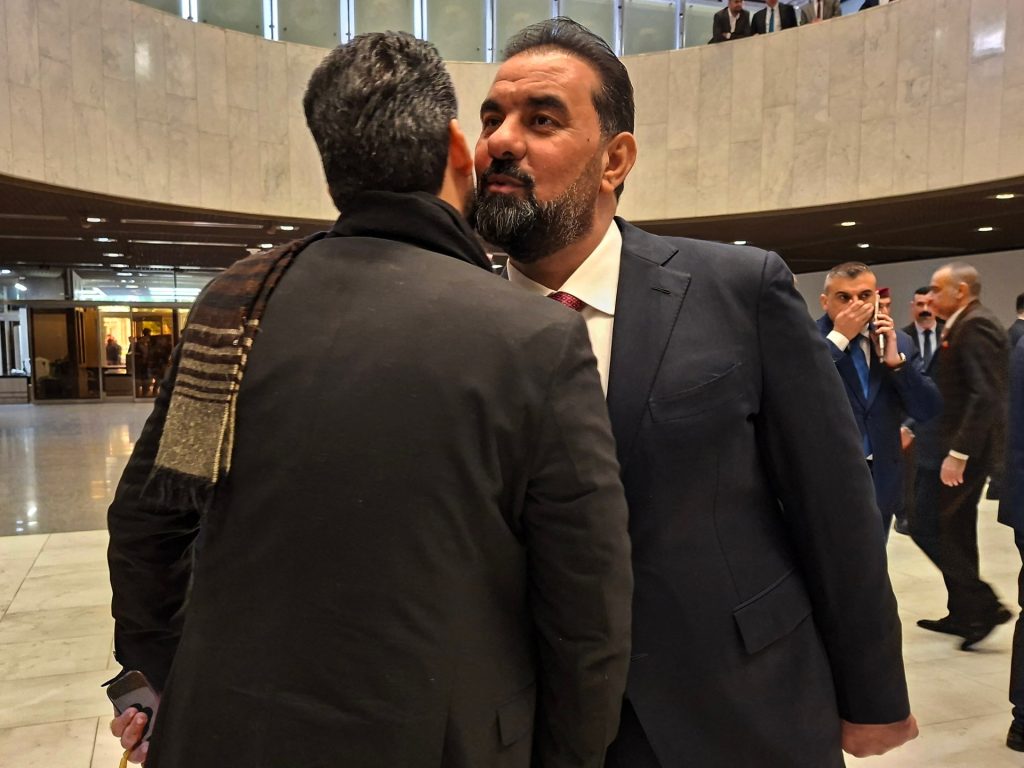
Haybat al-Halbousi, from the Taqaddum (Progress) Party, has been elected as speaker of the new parliament. Published On 29 Dec 202529 Dec 2025 Click here to share on social media share2 Share Iraq’s newly elected parliament has chosen Haybat al-Halbousi as its speaker, a significant step in the formation of the new government after months of political turmoil. Iraqi media reported on Monday, citing parliament’s media office, that al-Halbousi, from the Taqaddum (Progress) Party, had received 208 votes, in a clear victory over two rival contenders with 66 and nine votes, respectively. Recommended Stories list of 4 itemsend of list Al-Halbousi’s party draws its support largely from Sunni heartlands in the west and north of the country. Iraqis have been eagerly awaiting the first sitting of parliament, called the Council of Representatives of Iraq, as they look for certainty over the leadership of the country following the November 11 vote, which left a complicated outlook for the formation of the new government. Under Iraq’s customary muhasasa system, in place since the first government under the post-2003 constitution, parliament is to elect a speaker – a consensus Sunni candidate – along with two deputies during its first session. Following that is the vote for the presidency, a Kurdish candidate, according to muhasasa. The president then nominates the candidate of the largest Shia bloc – the Shia Coordination Framework (SCF) – to be named prime minister. Complicated picture Before the election, Supreme Judicial Council President Faiq Zaidan urged lawmakers to stick to the constitutional timeline for government formation – a maximum of 90 days – and the Federal Supreme Court (FSC) ratified the results faster than usual. Advertisement But few are expecting a swift result. The process typically takes months – in 2021, it took more than 300 days – and there are questions over who the SCF will choose as the right candidate for prime minister. Incumbent Prime Minister Mohammed Shia al-Sudani had been nominated by the SCF four years ago, but had tried to break free from the alliance, running an independent electoral list that won big with about 46 out of 329 seats for his Reconstruction and Development Coalition (RDC). But an FSC decision last month sent him back to the SCF and its leadership, many of whom do not hold parliamentary seats but operate as external power brokers. The SCF now faces the question of whether it backs al-Sudani or an alternative candidate as prime minister, while it grapples with how to respond to the growing parliamentary presence of lawmakers linked to Shia parties with pro-Iran, anti-West armed wings. Of the SCF’s 180-odd lawmakers, 80 to 90 belong to groups and armed factions close to Iran – most of them under United States sanctions. In 2021, such groups held only 17 seats. Their growing presence in parliament potentially presents a problem not only for Iraq’s relations with foreign powers, but for Iraqi Shias who resent Tehran’s powerful influence in the country. Adblock test (Why?)
Ukrainian soldiers target Russian drones with rifles
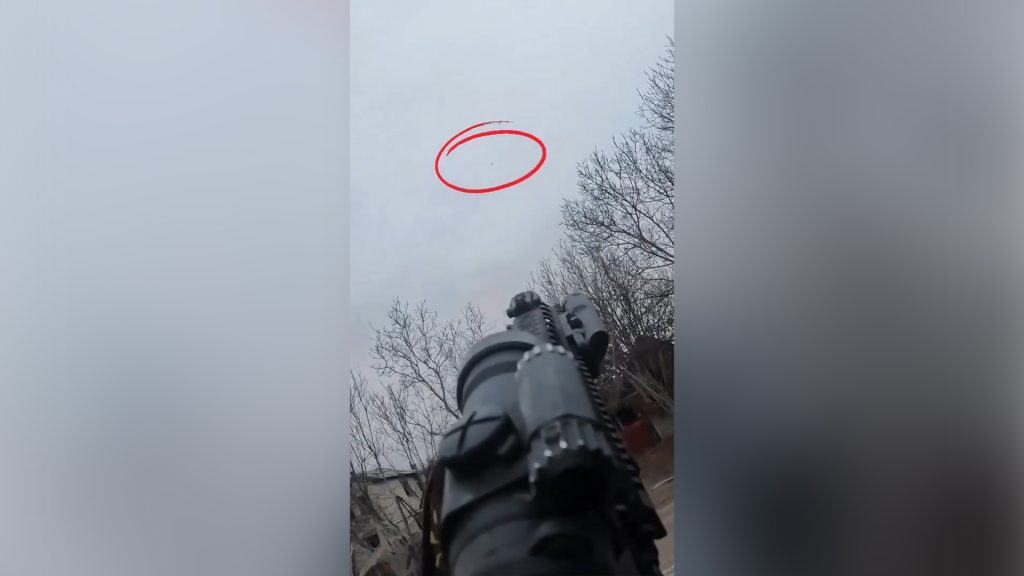
NewsFeed Video released by the Ukrainian military showed soldiers shooting down small Russian drones with their rifles near the small Donetsk village of Kostiantynivka. Russian forces have made steady yet costly gains in the region, claiming on Monday to have captured nearby Dibrova. Published On 29 Dec 202529 Dec 2025 Click here to share on social media share2 Share Adblock test (Why?)
Deadly protests and clashes in Syria – what happened and what’s next?

Protests have erupted across Syria’s coastal regions, marking a new wave of sectarian upheaval since the overthrow of Bashar al-Assad’s regime a year ago. During the protests on Sunday, gunfire was directed at Syrian security forces at the al-Azhari roundabout in Latakia while unknown assailants threw a hand grenade at the al-Anaza police station in the district of Banias in the Tartous governorate. Recommended Stories list of 4 itemsend of list The Alawite minority, which al-Assad is a member of, held the protests after at least eight people were killed in the bombing of an Alawite mosque in Homs on Friday. They are demanding security guarantees and political reforms. Several cities along Syria’s Mediterranean coast have experienced deadly sectarian violence over the past year, raising questions about whether the interim government can maintain unity in a nation still scarred by 14 years of civil war. So what are the protests about, and what do they mean for political and social stability in Syria? What sparked the protests? The bombing of the Imam Ali bin Abi Talib Mosque in the Wadi al-Dahab neighbourhood of Homs during Friday prayers led to the demonstrations. The bombing was claimed by a little-known group called Saraya Ansar al-Sunna, which said on its Telegram channel that the attack was intended to target members of the Alawite sect. Syria’s security and political establishment was dominated by Alawites until al-Assad’s regime fell in December 2024. Saraya Ansar al-Sunna also had claimed responsibility for a suicide bombing of a Damascus church in June that killed at least 20 people. Advertisement Syria’s government condemned the mosque attack on Friday, describing it as the latest in a series of “desperate attempts to undermine security and stability and sow chaos among the Syrian people”. Who’s leading the protests? The protests were primarily organised after calls for action by Ghazal Ghazal, an Alawite religious figure who lives outside Syria with little known about his whereabouts. He heads a group called the Supreme Alawite Islamic Council in Syria and Abroad. “We want political federalism. … We want to determine our own destiny,” Ghazal said in a video message on Facebook, referring to a system of government under which power is shared between the national government and its states. Protesters also called for greater protections for the Alawite community, accountability for attacks against civilians and political guarantees. In coastal areas, including the cities and wider governorates of Latakia and Tartous, clashes broke out between Alawite protesters and counterprotesters supporting the new government. Al Jazeera’s correspondent in Latakia reported seeing counterprotesters throwing rocks at Alawite demonstrators while a group of protesters beat a counterprotester who entered their area. Syria’s Ministry of Defence said on Sunday that army units had moved into the centres of these cities after assaults by “outlaw groups” targeting civilians and security personnel with the aim of re-establishing stability. Have there been any casualties? SANA, the official Syrian news agency, reported that four people have been killed and more than 100 injured in the unrest in Latakia. Quoting officials from Syria’s Directorate of Health, SANA said injuries included “stabbings, blows from stones, and gunfire targeting both security personnel and civilians”. Later on Sunday, the Interior Ministry reported that one of its security officers had been killed in the clashes. Two security personnel were wounded in Tartous when unknown assailants threw a hand grenade at the al-Anaza police station. Who are the Alawites? The Alawites are a religious minority in Syria and are the second largest religious group after Sunni Muslims. Alawites make up 10 percent of Syria’s 23 million people, but this community was politically dominant under al-Assad, who ruled Syria beginning in 2000 and recruited heavily from the Alawite community for his army and security apparatus. Members of the Syrian security forces stand atop tanks after being deployed during protests in Latakia on December 28, 2025 [Karam al-Masri/Reuters] Since al-Assad’s overthrow, Syria has seen several instances of sectarian violence. In March, violence broke out in coastal cities, including Latakia, Banias, Tartous and Jableh, and government-allied groups were accused of carrying out summary executions, mostly of Alawite civilians. Advertisement A government committee tasked with investigating the attacks concluded that about 1,400 people were killed during several days of violence. In July, violence between Druze and Sunni Bedouin communities flared up in the southern governorate of Suwayda, although experts say this conflict is rooted in more complex issues than just sectarianism, including in historical disputes over land. That unrest escalated into Israel bombing Syria’s Ministry of Defence and other targets in the capital Damascus – ostensibly to protect the Druze, although local activists and analysts said Israel’s aim was to fuel internal instability. Alawites have also voiced grievances about discrimination in public sector hiring since al-Assad’s fall as well as the detention of young Alawite men without charge. Will the Syrian government be able to maintain peace? Syria’s interim president, Ahmed al-Sharaa, has emphasised the need to “preserve national unity and domestic peace”. At the Doha Forum this month, al-Sharaa said people in Syria “simply did not know each other well” due to issues inherited from the al-Assad regime. Syria’s enduring sectarian divides and the central government’s limited authority are fuelling demands from minorities for decentralisation, according to Rob Geist Pinfold, a scholar of international security at King’s College London. The Alawites are not the only minority who have aired concerns about sectarianism since the fall of al-Assad, Geist Pinfold told Al Jazeera. The interim government so far has failed to integrate regions controlled by the Kurdish-led Syrian Democratic Forces (SDF) into the new government, he added, despite a March 10 agreement between them that planned for integration. This is largely down to mistrust, experts said. Minority groups, including Alawites and the Druze, “simply don’t think that the government has their best interests at heart and actually see the government as a security threat”, Geist Pinfold explained. “Syria is caught up in this vicious cycle where the government doesn’t have trust with minority groups.
Niger’s military rulers order ‘general mobilisation’ against armed groups

The military rulers expand emergency powers, warning that people, property, and services may be requisitioned. Published On 28 Dec 202528 Dec 2025 Click here to share on social media share2 Share Niger’s military rulers have approved a general mobilisation and authorised the requisition of people and goods as they intensify the fight against armed groups across the country, according to a government statement. The decision followed a cabinet meeting on Friday and marks a major escalation by the military government, which seized power in a July 2023 coup that toppled the country’s democratically elected president, Mohamed Bazoum. Recommended Stories list of 4 itemsend of list “People, property, and services may be requisitioned during general mobilisation to contribute to the defence of the homeland, in compliance with the legislation and regulations in force,” the government said in a statement issued late on Saturday. “Every citizen is required to respond immediately to any call-up or recall order, to comply without delay with the implementation of measures for the defence of the homeland, and to submit to requisition,” it added. The authorities said the measures aim to “preserve the integrity of the national territory” and “protect the population” as Niger continues to face attacks by armed groups operating across several regions. Niger has been embroiled in deadly armed conflict for more than a decade, with violence linked to fighters affiliated with al-Qaeda and the ISIL (ISIS) group. Nearly 2,000 people have been killed, according to the Armed Conflict Location and Event Data Project (ACLED), which tracks political violence. The southeast of the country has also suffered repeated attacks by Boko Haram and its splinter group, the ISIL affiliate in West Africa Province (ISWAP), further stretching Niger’s security forces. Advertisement The mobilisation order comes five years after Niger expanded its armed forces to around 50,000 troops and raised the retirement age for senior officers from 47 to 52. Since taking power, the military government has also urged citizens to make “voluntary” financial contributions to a fund launched in 2023 to support military spending and agricultural projects. Soon after the coup, Niger’s rulers ordered French and United States troops, who had supported operations to combat rebel fighters, to withdraw from the country. Niger has since deepened security cooperation with neighbouring Mali and Burkina Faso, also ruled by a military government. The three Sahel states have formed a joint force of 5,000 troops, presenting it as a regional response to armed groups while further distancing themselves from Western partners. Adblock test (Why?)
Protests turn deadly during demonstration in Syrian city of Latakia

NewsFeed Fighting has broken out at a demonstration in the city of Latakia in Syria, killing at least three people and injuring dozens. Hundreds of people from the Alawite minority were protesting in coastal and central parts of the country, two days after a mosque was bombed in Homs. Published On 28 Dec 202528 Dec 2025 Click here to share on social media share2 Share Adblock test (Why?)

